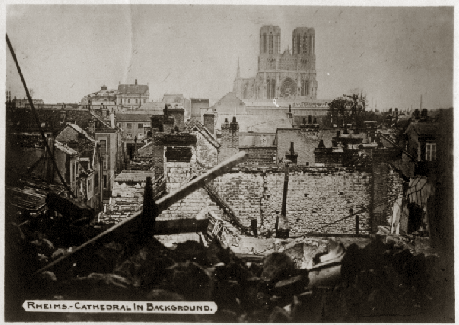

 | Toward the end of his life, Machaut, wrote a handful of motets in Latin (much of his composition is in the vernacular). It is likely that these motets were written in response to the great political turmoil that characterized the period of their composition. The Hundred-Years War had been dragging on for quite some time when after a truce between France and England, the King of England, Edward III, crossed the sea and laid siege to Machaut's city, Rheims, (map) with the intention of being crowned King of France at Rheims cathedral, the traditional site for the cronwing of the French monarchy. Edward's army arrived on the outskirts of the city in early December 1359 and staged a blockade through the rough winter and into late January of the following year. Charles, the king of France decided to let the English exhaust themselves in a siege while the French armies stayed passive. He sent a letter to the citizens of Rheims, telling them to: "guard well and defend yourselves and your city against our enemies; by which we will perceive clearly your great loyalty and very good and true love that you have for Monseigner, for us and for the crown of France." Sieges at the time ended usually with the entire population being put to the sword. Rheims ran out of food, and plague broke out. As a canon at the cathedral, Machaut would have been compelled to stay in the city. One can imagine the fear and privation. Eventually Edward would grow tired of the siege and set off to pillage Burgundy. Incidentally, among the English troops at Rheims was Machaut's great English contemporary, Chaucer, who was held hostage and later released for a ransom of approximately $4,000. For the curious, a timeline of the Hundred Years War can be found here. |
| Untexted: [Chri - ste?] | 0:00 | Introduction: Entrance of Superius voice in archaic liturgical style. |
| Untexted: [Ve - ni?] | 0:27 | Introduction (cont.): Entrance of Altus voice in counterpoint. |
| Untexted | 0:43 | Tenor and Contratenor enter to cadence Introduction |
| Christe qui lux est / Veni | 0:56 | Beginning of First rhythmic scheme (talea) |
| Posse tuum / Veni, propera | 1:30 | Beginning of Second Talea. |
| Nec tueri / [no - ] bis dant vecordia | 2:05 | Beginning of Third Talea |
| Et adire nexu / [ignora - ] mus, Quid agere | 2:39 | Beginning of Fourth Talea |
| a te segregas / [predo - ] nes: Leopardi | 3:14 | Both talea and color (melodic scheme) end. Rhythmic and melodic cycles begin again at double-speed. |
Christe, qui lux est Christe, qui lux es et dies fideliumque requies nos visita. Tu furoris temperies tu dulcoris planiities nunc excita. posse tuum precipita depredentes qui nos ita viturperant. Sicut per te fruit vita patribus nostris reddita, qui tunc erant nec tueri se poterant. Sed ad te reclamaverant, Deus fortis, sie cave, ne nos atterant qui nos in guerris lacerant nunc subortis. Et adire nexu mortis, cuius sumus jam in portis, nos pretegas. Gentem serves tue sortis, tui fratis ac consortis causam regas. Qui malos a te segregas nec justis opem denegas. Legis lator. proditores nunc detegas horumque visum contegas. Consolatur, Danielis visitator pueroumque salvator in fornace, per Abacuth confortator sis pro nobis preliator et dimittas nos in pace. Veni Creator Spiritus Veni creator spiritus flentium audi gemitus, quos nequiter gens misera destruit; veni, prospera, jam nostra virtus deficit nec os humanum sufficit ad narrandum obprobria que nobis dant vecorida, diviso, cupiditas fideliumque raritas. Unde flentes ignoramus quid agere debeamus. Circumdant nos inimici, sed et nostri domestici conversi sunt in predones: leopardi et leones, lupi, milvi et aquile rapiunt omne reptile, consumunt nost carbunculi. Ad te nostri sunt oculi, perde gentem hanc rapacem, Jhesu, redemptor seculi, et da nobis pacem. Tribulatio proxima est Tribulatio proxima est et non est qui adjuvet |
Christe, qui lux est Christ, you that are light and the day the faithfuls' rest come back to visit us. You that alleviate thhe fury, you that spill the sweetness, awaken us, impose your power to the vandals who offend us. Thanks to you, life was returned to our fathers who, previously, lived unable to relax. But they addressed you strong God. In te same way, prevent that we are thrown on the ground by those that tear usin wars that they provoked. And, in the embrace of death of which we are so near, protect us. Even on those of your condition, take your brother's party and the party of your companion. You that move away from you the mean do not refuse your support to the just. You the legislator unmask traitors and defend the reputation of the just. You the comforter, who has visited Daniel, who saved children in the furnace. In the name of the comforter of Abacuq be our defender And let us leave in peace. Veni Creator Spiritus Come, creative Mind, hear the moan of the tearful that amiserable people maliciously destroyed; come, precipitate you! already our strengths decline no human voice is enough to tell the shame that bring the fury, the derision, the cupidity, the lack of men with faith. Also, we cry and know not what to do. Enemies surround us, even those near to us, become brigands, leopards and lions, wolves, vultures and eagles, snakes, rob all, scabs gnaw us. Our faces turn toward you, annihilate this people of birds of prey. Jesus, redeemer of the world, and give us your peace. Tribulatio proxima est Tribulaiton is close at hand. and there is no one to aid us. |